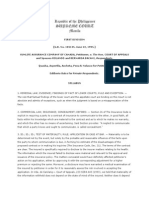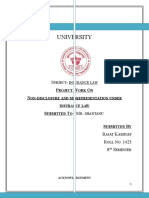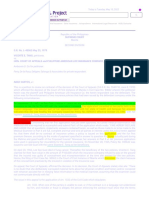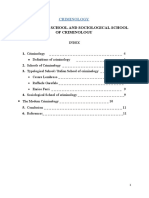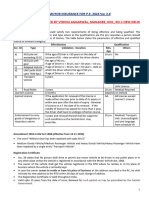Insurance Law
Insurance Law
Uploaded by
Akanksha SinghCopyright:
Available Formats
Insurance Law
Insurance Law
Uploaded by
Akanksha SinghCopyright
Available Formats
Share this document
Did you find this document useful?
Is this content inappropriate?
Copyright:
Available Formats
Insurance Law
Insurance Law
Uploaded by
Akanksha SinghCopyright:
Available Formats
1
BEFORE THE HON’BLE DISTT.SESSION COURT
APPLICANT
v.
INSURANCE COMPANY
PETITION INVOKED UNDER SECTION 45 OF
THE INSURANCE ACT
MEMORANDUM ON BEHALF OF THE DEFENDANT
2
TABLE OF CONTENTS
LIST OF ABBREVIATIONS - - - - - - - - - - - - - - - - - - - - - - - - - - - - - 4
INDEX OF AUTHORITIES - - - - - - - - - - - - - - - - - - - - - - - - - - - - - - 5
STATEMENT OF JURISDICTION - - - - - - - - - - - - - - - - - - - - - - - - - 6
STATEMENT OF FACTS - - - - - - - - - - - - - - - - - - - - - - - - - - - - - - -7-8
STATEMENT OF ISSUE - - - - - - - - - - - - - - - - - - - - - - - - - - - - - - - - 9
SUMMARY OF ARGUMENTS - - - - - - - - - - - - - - - - - - - - - - - - - - - -10
ARGUMENTS IN ADVANCE- - - - - - - - - - - - - - - - - - - - - - - - - - - - - 11-13
PRAYER - - - - - - - - - - - - - - - - - - - - - - - - - - - - - - - - - - - - - - - - - - - - 14
LIST OF ABBREVIATIONS
MEMORANDUM ON BEHALF OF THE DEFENDANT
3
& And
Art. Article
Govt. Government
Hon’ble Honorable
i.e., That is
No. Number
CrPC Criminal Procedure Code
U/S Under Section
V. Versus
Vol. Volume
Sec. Section
AIR All India Report
SCC Supreme Court Cases
Mad. Madras
SC Supreme Court
INDEX OF AUTHORITIES
MEMORANDUM ON BEHALF OF THE DEFENDANT
4
A. TABLE OF CASES
S. Name of the cases and case citation
No.
1. Joel v. Law Union & Crown Insurance Co.
2. United India Insurance Co. Ltd. Vs. M. K. J.
Corporation, (1996) 6 SCC 428
3. All India General Insurance Co. ... vs S.P. Maheshwari on 5
November, 1959 AIR 1960 Mad 484
B. BOOK
1. Conflict of Laws
C. JOURNALS
1. Journal of Banking and Insurance law
D.DATABASE REFFERED
1. www.lexology.com
2. enquiries@lexology.com
3. https://taxguru.in
4. https://indiankanoon.org
STATEMENT OF JURISDICTION
MEMORANDUM ON BEHALF OF THE DEFENDANT
5
THE PETITIONER HAS APPROACHED THE HON’BLE DISTT.
SESSSIONS COURT UNDER SEC. 26 OF CrPC.
STATEMENT OF FACTS
For The sake of brevity and convenience of this Hon’ble Court the facts of the
present case are summarized as follows:
1. That in 1942, one M sent a proposal for the insurance of his life.
MEMORANDUM ON BEHALF OF THE DEFENDANT
6
2. That, he was examined by Dr D. who submitted two reports, on with the
proposal form and one confidential, in the confidential report it was shown
that M was anemic, had a dilated heart and his right lung showed indications
of old attack of pneumonia or pleurisy and that he was a physical wreck.
3. That, nothing came out of the proposal sent by M and he lapsed.
4. That In 1943, M consulted Dr. L and also was treated by L for anemia
oedema of the feet, diarrhea and panting on exertion.
5. That in 1944, M made a second proposal for the insurance of his life.
6. That in the proposal form there was a question that whether he had consulted
any medical man for any ailment within the last five years, he gave the
answer, “NO”.
7. That he didn’t disclose any of his ailments.
8. That after medical examination by one Dr K. the proposal was accepted and a
policy for Rs. 25000/- was issued on March 13, 1945.
9. That the policy lapsed due to non-payment of premium but was revived in
July, 1946.
10. That in November 1946 M died and his assignee, the appellant, made a
demand for Rs 26000/- but the company on October 10, 1947, repudiated it
on the ground that the policy had been obtained by deliberate mis-statement
and fraudulent suppression of material facts.
11. Thereupon, the appellant filed a suit to recover the amount of the policy
contending that section 45 Insurance Act barred the company from calling in
question the policy after two years on the ground that any statement made in
the proposal was inaccurate or false.
MEMORANDUM ON BEHALF OF THE DEFENDANT
7
STATEMENT OF ISSUES
1. Whether the amount of policy should be given to the assignee or not?
MEMORANDUM ON BEHALF OF THE DEFENDANT
8
SUMMARY OF ARGUMENTS
1. Whether the amount of policy should be given to the assignee or not?
No, the amount should not be given to the assignee because when asked while
filling the form he had not disclosed any of his details and answered the same in
‘NO’ and that the applicant Misrepresented the company and he did not tell the
company about his medical condition to them. Therefore, the insurance
company as a result of this will not give the amount of Rs 26000/- to the
MEMORANDUM ON BEHALF OF THE DEFENDANT
9
applicant stating the fact that the policy has been obtained by Fraudulent
Suppression of material facts.
ARGUMENT IN ADVANCE
1. Whether the amount of policy should be given to the assignee or not?
No, the amount should not be given to the assignee because when asked while
filling the form he had not disclosed any of his details and answered the same in
‘NO’ and that the applicant Misrepresented the company and he did not tell the
company about his medical condition to them. Therefore, the insurance
company as a result of this will not give the amount of Rs 26000/- to the
MEMORANDUM ON BEHALF OF THE DEFENDANT
10
applicant stating the fact that the policy has been obtained by Fraudulent
Suppression of material facts.
According to s. 45 of Insurance Act:
Section 45 of the Insurance Act prescribes a statutory period of two years within
which however it is open to the insurance company to repudiate liability on the
contract on the ground of false and inaccurate information furnished by the
assured in these statements, though after this period the Insurance company is
entitled to repudiate only on the ground that the disclosure or non-disclosure of
a material fact has been fraudulently made. A contract of life Insurance has been
called one 'uberrimae fidei' in which the insurer is entitled to be put in
possession of all the material information possessed by the insured.
The contract of insurance is based on the doctrine of ‘Utmost Good Faith’,
which means a person applying for an insurance cover has to disclose and
reveal all material information required by insurance company. Material
Information means all those information on the basis of which underwriter
access the risk profile of the person and decide to accept the risk and issue the
insurance policy or decline the same.
It is not for the proposer to determine whether information sought for is material
for the purpose of the policy or not. The obligation to disclose extends on to
facts which are known to the applicant and not to what he ought to have known.
The obligation to disclose necessarily depends upon the knowledge one
possesses. His opinion of the materiality of that knowledge is of no movement.
The Insurance Regulatory & Development Authority of India, by a Notification
dated October 16, 2002 issued the Insurance Regulatory & Development
Authority (Protection of Policyholders Interests) Regulations 2002.
The expression Proposal Form is defined in Regulation 2(d) thus:
2 (d) Proposal Form means a Form to be filled in by the Proposer for
Insurance, for furnishing all material information required by the Insurer
in respect of a risk, in order to enable the Insurer to decide whether to
accept or decline, to undertake the risk, and in the event of acceptance of
the risk, to determine the rates, terms and conditions of a cover to be
granted.
Explanation: Material for the purpose of these regulations shall mean and
include all important, essential and relevant information in the context of
MEMORANDUM ON BEHALF OF THE DEFENDANT
11
underwriting the risk to be covered by the insurer. Regulation 4, deals with
Proposals for Insurance and is in the following terms: Proposal for Insurance:
1. Except in cases of a marine insurance cover, where current market practices
do not insist on a written proposal form, in all cases, a proposal for grant of a
cover, either for life business or for general business, must be evidenced by a
written document. It is the duty of an insurer to furnish to the insured free of
charge, within 30 days of the acceptance of a proposal, a copy of the proposal
form.
2. Forms and documents used in the grant of cover may, depending upon the
circumstances of each case, be made available in languages recognized under
the Constitution of India.
3. In filling the form of proposal, the prospect is to be guided by the provisions
of Section 45 of the Act. Any proposal form seeking information for grant of
life cover may prominently state therein the requirements of Section 45 of the
Act.
4. Where a proposal form is not used, the insurer shall record the information
obtained orally or in writing, and confirm it within a period of 15 days thereof
with the proposer and incorporate the information in its cover note or policy.
The onus of proof shall rest with the insurer in respect of any information not so
recorded, where the insurer claims that the proposer suppressed any material
information or provided misleading or false information on any matter material
to the grant of a cover.
In -- 'Joel v. Law Union & Crown Insurance Co.', (1908) 2-KB 863 at p. 883
(A), Fletcher Moulton L. J. in explaining this doctrine derived from Lord
Blackburn's dictum in -- 'Brownlie v. Campbell', (1880) 5 AC 925 (B), made
this observation:
"There is, therefore, something more than an obligation to treat the insurer
honestly and frankly, and freely to tell him what the applicant thinks it is
material he should know .... The disclosure must be of all you ought to have
realized to be material, not of that only which you did in fact realize to be so."
“Thus, if a person effecting a policy of insurance says "I warrant such and such
things which are here stated", and that is part of the contract, then, whether they
are material or not is quite unimportant; the party must adhere to his warranty,
whether material or immaterial. But if the party makes no warranty at all but,
MEMORANDUM ON BEHALF OF THE DEFENDANT
12
simply makes a certain statement, if that statement has been made bona fide
unless it is material, it does not signify whether it is false or not false. Indeed,
whether made bona fide or not if it is not material, the untruth is quite
unimportant. If there is no fraud in a representation it is perfectly clear that it
cannot affect the contract; and even if material but there is no fraud in it, and it
forms no part of the contract, it cannot vitiate the right of the party to recover.”1
In [United India Insurance Co. Ltd. Vs. M. K. J. Corporation, (1996) 6
SCC 428], Supreme Court of India held as under;
It is a fundamental principle of Insurance Law that utmost good faith must be
observed by the contracting parties. Good faith forbids either party from
concealing (non-disclosure) what he privately knows, to draw the other into a
bargain, from his ignorance of that fact and his believing the contrary. Just as
the insured has a duty to disclose, similarly, it is the duty of the insurers and
their agents to disclose all material facts within their knowledge, since
obligation of good faith applies to them equally with the assured.
Thus, on the above observations in this case the company is not liable to pay the
amount demanded by the assignee.
PRAYER
Wherefore in the light of facts presented, issue raised, arguments advanced and
authority citied, the Counsels on behalf of the Respondent humbly pray for this
Hon’ble Courts that it may be pleased to adjudge and declare that:
- The petition should be dismissed, and
- The insurance company is liable to pay the amount of Rs 26/-000 to the
applicant.
Or pass any other order that the court may deem fit on the light of equity, justice
and good conscience and for this Act of kindness or your Lordships of the
Petitioner shall as duty bound ever pray.
1
All India General Insurance Co. ... vs S.P. Maheshwari on 5 November, 1959 AIR
1960 Mad 484
MEMORANDUM ON BEHALF OF THE DEFENDANT
You might also like
- Mastering Your Money - A Guide To Financial FreedomDocument9 pagesMastering Your Money - A Guide To Financial FreedomDavid EliasNo ratings yet
- Accenture InnovationDocument8 pagesAccenture InnovationMOHIT KUMARNo ratings yet
- Bhu Moot CourtDocument17 pagesBhu Moot Courtkalpanasoren2003No ratings yet
- Reliance_Life_Insurance_Co_Ltd_and_Ors_vs_RekhabenSC20192604191656352COM742760Document16 pagesReliance_Life_Insurance_Co_Ltd_and_Ors_vs_RekhabenSC20192604191656352COM742760mokshilohchab12No ratings yet
- Sun Life Assurance Corp. of Canada V Court of Appeals (245 SCRA 268)Document7 pagesSun Life Assurance Corp. of Canada V Court of Appeals (245 SCRA 268)Florz GelarzNo ratings yet
- G.R. No. 105135 June 22, 1995 - Sunlife Assurance Company of Canada v. Court of Appeals, Et Al.Document8 pagesG.R. No. 105135 June 22, 1995 - Sunlife Assurance Company of Canada v. Court of Appeals, Et Al.Vanny Gimotea BaluyutNo ratings yet
- Megha Moot CourtDocument26 pagesMegha Moot Courtkalpanasoren2003No ratings yet
- and 10 Eternal Gardens Memorial Park Corporation vs. Philippine American Life Insurance CompanyDocument10 pagesand 10 Eternal Gardens Memorial Park Corporation vs. Philippine American Life Insurance CompanyJaja Ordinario Quiachon-AbarcaNo ratings yet
- Insurance Digest Part 2 6Document37 pagesInsurance Digest Part 2 6Anonymous 7KthFJ1km0% (1)
- Arguendo MemorialDocument14 pagesArguendo Memorialaayushi pandeyNo ratings yet
- Case InsDocument6 pagesCase InsBilog Ang MundoNo ratings yet
- Memorial Final 2Document14 pagesMemorial Final 2kalpanasoren2003No ratings yet
- Concealment: Insurance Law Case Digests SY 2010-2011Document1 pageConcealment: Insurance Law Case Digests SY 2010-2011BreAmberNo ratings yet
- Utmost Good FaithDocument10 pagesUtmost Good FaithAditya PrakashNo ratings yet
- American International Assurance Co LTD V See Ah Yu: 566 (1996) 3 CLJ Current Law JournalDocument7 pagesAmerican International Assurance Co LTD V See Ah Yu: 566 (1996) 3 CLJ Current Law JournalNick TanNo ratings yet
- Case Studies: 1. Brief History Behind Life InsuranceDocument21 pagesCase Studies: 1. Brief History Behind Life Insurancevaibhav11888No ratings yet
- Revealing The Reality Behind The Insurance Companies: Case Study Under Section 45.Document29 pagesRevealing The Reality Behind The Insurance Companies: Case Study Under Section 45.Raja MedaNo ratings yet
- 168624-2013-Manila Bankers Life Insurance Corp. v. AbanDocument8 pages168624-2013-Manila Bankers Life Insurance Corp. v. AbanJessica Magsaysay CrisostomoNo ratings yet
- Chanakya National Law University: P W O NDocument18 pagesChanakya National Law University: P W O NRajat KashyapNo ratings yet
- Argent v. West CoastDocument4 pagesArgent v. West CoastHency TanbengcoNo ratings yet
- Eternal Gardens Memorial G.R. No. 166245 Park Corporation,: Republic of The Philippines Supreme Court Baguio CityDocument13 pagesEternal Gardens Memorial G.R. No. 166245 Park Corporation,: Republic of The Philippines Supreme Court Baguio CityRomel LacidaNo ratings yet
- Insurancecase Digest June 22, 2016Document10 pagesInsurancecase Digest June 22, 2016Albert BantanNo ratings yet
- Eternal Gardens Memorial Park Corporation, Petitioner, vs. The Philippine American Life Insurance Company, RespondentDocument10 pagesEternal Gardens Memorial Park Corporation, Petitioner, vs. The Philippine American Life Insurance Company, RespondentAlexiss Mace JuradoNo ratings yet
- Sunlife Assurance of Canada vs. CA GR No. 105135 June 22 1995Document4 pagesSunlife Assurance of Canada vs. CA GR No. 105135 June 22 1995wenny capplemanNo ratings yet
- White GoldDocument110 pagesWhite GoldGlenn PinedaNo ratings yet
- United States Court of Appeals, Eleventh CircuitDocument7 pagesUnited States Court of Appeals, Eleventh CircuitScribd Government DocsNo ratings yet
- Misrepresentation Non Disclosure Abd Breach of Warranty by The InsuredDocument18 pagesMisrepresentation Non Disclosure Abd Breach of Warranty by The InsuredRaunak KashyapNo ratings yet
- Sunlife Assurance Company of Canada vs. Court of AppealsDocument6 pagesSunlife Assurance Company of Canada vs. Court of AppealsJaja Ordinario Quiachon-AbarcaNo ratings yet
- Repudiation of Contract of Life InsuranceDocument5 pagesRepudiation of Contract of Life InsuranceAishwarya AdlakhaNo ratings yet
- Tan V CADocument6 pagesTan V CAMara ClaraNo ratings yet
- Insurance Nov 23Document10 pagesInsurance Nov 23Pearl Deinne Ponce de LeonNo ratings yet
- Case Analysis Insurance LawDocument3 pagesCase Analysis Insurance Lawarun100% (1)
- NG Gan Zee Vs Asian CrusaderDocument3 pagesNG Gan Zee Vs Asian CrusaderCeline Chiuco MarceloNo ratings yet
- Oriental Insurance Co. Ltd. Vs Gujarat State Warehousing ... On 4 December, 2004Document6 pagesOriental Insurance Co. Ltd. Vs Gujarat State Warehousing ... On 4 December, 2004ranpandeNo ratings yet
- G.R. No. L-30685Document3 pagesG.R. No. L-30685Tin LicoNo ratings yet
- NG Gan Zee Vs Asian CrusaderDocument3 pagesNG Gan Zee Vs Asian CrusaderWatz RebanalNo ratings yet
- 2022LHC6669Document17 pages2022LHC6669Umair ZiaNo ratings yet
- Eternal Gardens Memorial Park VDocument3 pagesEternal Gardens Memorial Park VPaolo TarimanNo ratings yet
- Sun Assurance Company of Canada vs. Court of AppelasDocument2 pagesSun Assurance Company of Canada vs. Court of AppelasMay RMNo ratings yet
- United States Court of Appeals, Fifth CircuitDocument9 pagesUnited States Court of Appeals, Fifth CircuitScribd Government DocsNo ratings yet
- JUDGMENT - ORDER IN - WRIT - C No. 3149 of 2016 at Allahabad Dated-3.4.2023 CASE TITLE - Smt. Parul Agarwal vs. L.I.C. and 3 OthersDocument9 pagesJUDGMENT - ORDER IN - WRIT - C No. 3149 of 2016 at Allahabad Dated-3.4.2023 CASE TITLE - Smt. Parul Agarwal vs. L.I.C. and 3 OthersGirjesh PatidarNo ratings yet
- Saura Import and Export INc Case 15184Document3 pagesSaura Import and Export INc Case 15184Alvin-Evelyn GuloyNo ratings yet
- Elise I. Cliborn v. The Lincoln National Life Insurance Co., A Corporation, 332 F.2d 645, 10th Cir. (1964)Document4 pagesElise I. Cliborn v. The Lincoln National Life Insurance Co., A Corporation, 332 F.2d 645, 10th Cir. (1964)Scribd Government DocsNo ratings yet
- Drafting Pleading and ConveyancingDocument14 pagesDrafting Pleading and ConveyancingAbhishek DixitNo ratings yet
- G.R. No. 175666 July 29, 2013 Manila Bankers Life Insurance Corporation, Petitioner. CRESENCIA P. ABAN, RespondentDocument7 pagesG.R. No. 175666 July 29, 2013 Manila Bankers Life Insurance Corporation, Petitioner. CRESENCIA P. ABAN, Respondentwenny capplemanNo ratings yet
- Sunlife Vs CADocument2 pagesSunlife Vs CAstealthestars8100% (1)
- 44.sun Life Assurance Vs CADocument2 pages44.sun Life Assurance Vs CAMariny Del rosarioNo ratings yet
- O.F. Santos & P.C. Nolasco For Petitioners. Ferry, de La Rosa and Associates For Private RespondentDocument5 pagesO.F. Santos & P.C. Nolasco For Petitioners. Ferry, de La Rosa and Associates For Private Respondentwenny capplemanNo ratings yet
- Petitioner vs. vs. Respondents Quasha, Asperilla, Ancheta, Pena & Nolasco Edilberio BalceDocument5 pagesPetitioner vs. vs. Respondents Quasha, Asperilla, Ancheta, Pena & Nolasco Edilberio BalceMary Joessa Gastardo AjocNo ratings yet
- BLJ 1996 2 128 RavendrenDocument8 pagesBLJ 1996 2 128 RavendrenNick TanNo ratings yet
- Insurance Documents: Student CornerDocument7 pagesInsurance Documents: Student CornerPrem SagarNo ratings yet
- Tonder V RAFDocument32 pagesTonder V RAFZane Van HeerdenNo ratings yet
- Insurance Case DigestsDocument40 pagesInsurance Case DigestsCharis OsipNo ratings yet
- Tan v. CA, 174 SCRA 403 (1989)Document5 pagesTan v. CA, 174 SCRA 403 (1989)KristineSherikaChyNo ratings yet
- HEALTH-GROUP MEDICLAIM June 2021Document61 pagesHEALTH-GROUP MEDICLAIM June 2021Kishore mohan ManapuramNo ratings yet
- Reply - Accident Insurance Case - NARAG LAW OFFICEDocument9 pagesReply - Accident Insurance Case - NARAG LAW OFFICENARAG LAW OFFICENo ratings yet
- 56 - Sunlife Assurance Vs Court of AppealsDocument1 page56 - Sunlife Assurance Vs Court of AppealsperlitainocencioNo ratings yet
- G.R. No. L-48563Document3 pagesG.R. No. L-48563Christian Edwin Jude PalaganasNo ratings yet
- INTRODUCTION Insurance ProjectDocument4 pagesINTRODUCTION Insurance ProjectAbhay TiwariNo ratings yet
- 135747-1983-Ng Gan Zee v. Asian Crusader Life AssuranceDocument5 pages135747-1983-Ng Gan Zee v. Asian Crusader Life AssuranceJessica Magsaysay CrisostomoNo ratings yet
- 2 Pacific Banking Corporation V CA and Oriental AssuranceDocument3 pages2 Pacific Banking Corporation V CA and Oriental AssuranceKokoNo ratings yet
- Laws of Intellectual RightsDocument9 pagesLaws of Intellectual RightsAkanksha SinghNo ratings yet
- EthicsDocument9 pagesEthicsAkanksha SinghNo ratings yet
- Project Labour LawDocument13 pagesProject Labour LawAkanksha SinghNo ratings yet
- Political Science MinorDocument11 pagesPolitical Science MinorAkanksha SinghNo ratings yet
- SOCIOLOGYDocument11 pagesSOCIOLOGYAkanksha SinghNo ratings yet
- CRIMINOLOGYDocument9 pagesCRIMINOLOGYAkanksha SinghNo ratings yet
- Administrative LawDocument16 pagesAdministrative LawAkanksha SinghNo ratings yet
- Family LawDocument3 pagesFamily LawAkanksha SinghNo ratings yet
- Awareness of Two Wheeler Insureance Policy Among PeopleDocument81 pagesAwareness of Two Wheeler Insureance Policy Among PeopleNISHA PAHERWARNo ratings yet
- Payroll SystemDocument103 pagesPayroll SystemHIMYM FangirlNo ratings yet
- 06 - Xyz Contracting Corporation Sample Financial Statements PDFDocument11 pages06 - Xyz Contracting Corporation Sample Financial Statements PDFFauTahudAmparoNo ratings yet
- 1 To 1 BYB FormatDocument17 pages1 To 1 BYB Formatmuliadi.prudentialNo ratings yet
- Answers To Test Yourunderstanding QuestionsDocument5 pagesAnswers To Test Yourunderstanding QuestionsDean Rodriguez100% (2)
- A Cost-Benefit Analysis of 2018 Cataract Surgery in The United StatesDocument13 pagesA Cost-Benefit Analysis of 2018 Cataract Surgery in The United StatesasclepiuspdfsNo ratings yet
- CPAIM Couse SyllabusDocument48 pagesCPAIM Couse SyllabussajidtoshibaNo ratings yet
- Working of Post Offices and Measures To Improve ItDocument17 pagesWorking of Post Offices and Measures To Improve ItsuchethatiaNo ratings yet
- A Study On Satisfactory Levels of Farmers On Rythu Bandhu and Rythu Bheema Schemes in Rampur Village Adilabad DistrictDocument6 pagesA Study On Satisfactory Levels of Farmers On Rythu Bandhu and Rythu Bheema Schemes in Rampur Village Adilabad DistrictSharath GoudNo ratings yet
- Updated Motor Write Up For Pe 2023 Ver 2.0 by Vishnu AggarwalDocument32 pagesUpdated Motor Write Up For Pe 2023 Ver 2.0 by Vishnu Aggarwalrishabhdev0007No ratings yet
- Income Tax - Reviewer MaterialsDocument22 pagesIncome Tax - Reviewer Materialslheamaecayabyab4No ratings yet
- Sabeetha Final ProjectDocument52 pagesSabeetha Final ProjectPriyesh KumarNo ratings yet
- 661048e44e0f2116c41f9b54 All UPSTOX SIGNEDDocument24 pages661048e44e0f2116c41f9b54 All UPSTOX SIGNEDNikhil TutejaNo ratings yet
- Aia Health CoverDocument4 pagesAia Health CoverGilbert CalledoNo ratings yet
- Floater Health Insurance Analysis ReportDocument8 pagesFloater Health Insurance Analysis Reportenumula kumarNo ratings yet
- Ascertaining and Controlling RisksDocument23 pagesAscertaining and Controlling RisksAngelica Joyce DyNo ratings yet
- Komal 1234Document78 pagesKomal 1234PRIYANo ratings yet
- Aircraft Lease Agreement: TVPX Aircraft Solutions IncDocument141 pagesAircraft Lease Agreement: TVPX Aircraft Solutions Inckingsley nzeNo ratings yet
- CDSLDocument16 pagesCDSLSanjeedeep Mishra , 315No ratings yet
- The Oriental Insurance Company LimitedDocument2 pagesThe Oriental Insurance Company LimitedDuraisamyNo ratings yet
- Personal Financial Planning: Presented byDocument11 pagesPersonal Financial Planning: Presented byNeha Sathaye100% (1)
- Tata Magic Final)Document1 pageTata Magic Final)ankitNo ratings yet
- United Healthcare Uhc Premier 1250 Cwef GoldDocument11 pagesUnited Healthcare Uhc Premier 1250 Cwef GoldgalvinwNo ratings yet
- Paper 7: Direct Tax Laws & International Taxation: Questions and AnswersDocument19 pagesPaper 7: Direct Tax Laws & International Taxation: Questions and Answersneeraj sharmaNo ratings yet
- Handout Pengenalan Certified Financil Planner CFP Prospek Karir Perencana Keuangan Di Masa DepanDocument37 pagesHandout Pengenalan Certified Financil Planner CFP Prospek Karir Perencana Keuangan Di Masa DepangmsstaffoperationsNo ratings yet
- M Law - Memorandum On Financial Services - OPSDocument19 pagesM Law - Memorandum On Financial Services - OPSXiao Xie LeeNo ratings yet
- ACHOM Transformasi Mutu Layanan Dan Kerja Sama Faskes 09112023 2Document24 pagesACHOM Transformasi Mutu Layanan Dan Kerja Sama Faskes 09112023 2atalubisNo ratings yet
- Mastering Payroll HomeworkDocument16 pagesMastering Payroll Homeworklynguyen2996No ratings yet





